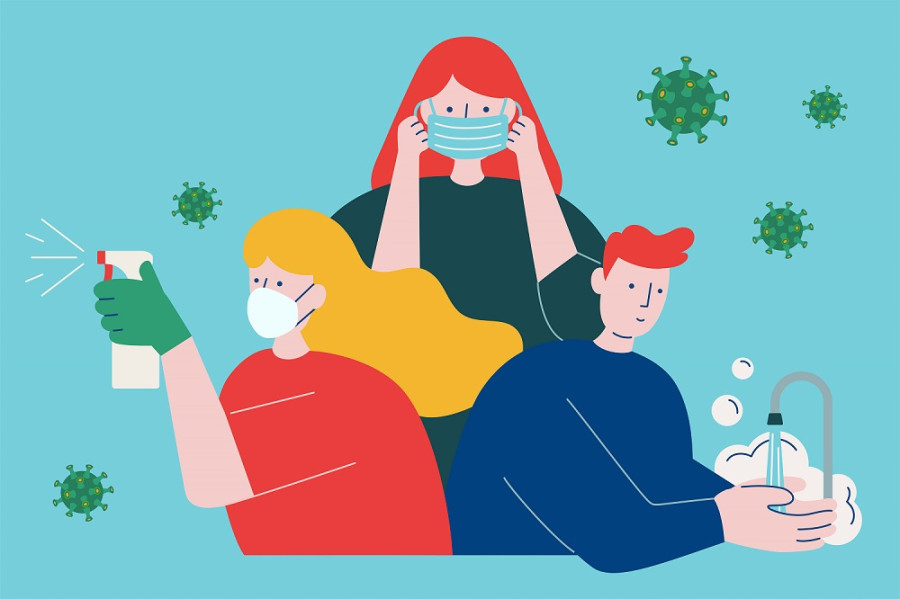Health
The lockdown may be over but the threat of Covid-19 is not
Here are some things to keep in mind to limit the spread of the virus in this post-lockdown world.
Tsering Ngodup Lama
Two weeks ago Dawa Sherpa decided to order food from his favourite restaurant. He called them up to place his order. But when he reached the restaurant to get his order, Sherpa was surprised to see that several people were dining in the restaurant. “Even though the restaurant’s seating area was poorly ventilated and there were no two metres of distance between each table, people were eating and sitting together,” said Sherpa. “I kept thinking about how unsafe it was, and it made me wonder why people weren’t taking the infection seriously. Don’t even get me started on the number of people I see not wearing a mask.”
On June 10, the government of Nepal decided to ease the strict nationwide lockdown. The move allowed some semblance of normalcy to return. Streets that were once deserted began to bustle with human and vehicle movements, and businesses that had remained shuttered for almost three months reopened. But as the lockdown eased, the number of Covid-19 cases also started seeing a spike. On June 10, the number of Covid-19 cases in Nepal was 4,364. Less than a month later, on July 8, the number of cases had increased nearly four-fold. As this article goes to print, the number stands at 16,168.
With the easing of the lockdown’s restrictions and the rising number of cases, it has become more important than ever for people to adopt precautionary safety measures to curb the spread of the virus. “Just because the lockdown has eased doesn’t mean we can now lower our guards down. The threat of Covid-19 is still very real when it was during the strict lockdown, and with the lockdown eased, we need to be more cautious,” said Dr Milesh Jung Sijapati, a pulmonologist.
But after months of lockdown, it’s understandable that people now want to go out. “Staying at home for months is not mentally and economically possible,” said Dr Ramu Kharel, who was until very recently practising at Grady Memorial Hospital in Atlanta, Georgia, US. “But as people go out it’s important that we keep in mind that every one of us has a vital role to play to curb the spread of the infection.”
In Atlanta, Kharel witnessed firsthand the severe repercussions of people not adhering to basic safety measures, like wearing masks and maintaining social distancing. For the past few days, the state of Georgia, where Atlanta is located, has seen a surge in Covid-19 cases, putting the state’s hospitals under immense pressure. “The hospital where I worked is now filled with Covid-19 patients. In the US, donning facemasks has become a political issue. And then there were a lot of protests where social distancing was not maintained at all. All these factors have resulted in a huge spike in numbers that has put a lot of pressure on the healthcare system,” said Kharel. “In Nepal, if we fail to slow down the spread of the infection, it will be really bad because the country’s healthcare system is really weak and it won’t be able to handle a surge in cases that require critical care.”
Follow SMS protocol rigorously
“SMS stands for social distancing, mask and sanitising, and people must follow them at all times,” said Sijapati. “They are the most effective tools we have to slow down the spread of Covid-19.”
Various studies have shown that more than 40 percent of people infected with Covid-19 are asymptomatic, meaning they do not have the symptoms associated with the infection, but they can still infect other people. “The virus is transmitted via the droplets we release when we cough, sneeze and speak,” said Kharel. “This is why wearing a mask is so important because that way you not only protect yourself from contracting the virus but also protect other people from you. Wearing a mask is a moral responsibility that we should all strictly adhere to. Equally important is to know how to wear and take off masks properly.”
According to a recently published study, in parts of the US that mandated wearing masks, there was a drop in daily Covid-19 cases. Another study conducted by researchers concluded that if 80 percent of the population wore masks then that would be more helpful in flattening the curve than a strict lockdown.
“But unfortunately, I see a lot of people not wearing masks out in public and not maintaining social distancing, and that’s a cause of worry. A few days ago, I went to one of the Bhatbhateni Supermarket stores, and I was surprised to see that there was no social distancing whatsoever inside,” said Sijapati, who has since decided to get his groceries home delivered.
Limit your trips to the supermarket
Housed in large halls, supermarkets, many of which are not very well ventilated, see hundreds of visitors daily, which increases the risk of exposure to the virus. “Instead of going grocery shopping several times a week, limit it to once a week. Make a list of all that you want for a week or two and buy them on one visit. And a big no to leisurely browsing the aisles of the supermarket,” said Sijapati.
Cut down your social outings
One of the things Sherpa says he missed the most during the lockdown was spending time with his friends. “We are social beings and we crave social interactions,” said Sherpa. “When the lockdown was eased, the first thing that I wanted to do was hang out with them, and we did. But I also felt I was very irresponsible by doing that, and have since limited our hangouts to online.”
These social gatherings could lead to a surge in cases, believe doctors. “People here tend to regard lockdown as Nepal bandha,” says Sijapati. “And now that the lockdown has been eased, people seem to take it as an opportunity to attend wedding ceremonies, hang out in neighbourhood tea shops, and go out with friends,” said Sijapati. “It’s highly advised to not go out until or unless you have to. And if you have to go out, make sure to wear a mask at all times, sanitise your hands every now and then, and maintain social distance.”
Exercise outdoors but with caution
Research has time and again shown that regular exercise is crucial to boost the immune system and therefore to maintain good health. But with gyms closed for months, many might be compelled to find other ways to keep themselves fit. “Going for a walk or a run outdoors is relatively safe given that you make sure you are following SMS,” says Sijapati. “With all the fitness apps, and videos on YouTube, it is even possible to exercise in the comfort of your own room, which is a lot safer.”
With Covid-19 showing no signs of slowing down anytime soon—until or unless the world has a vaccine—there is no alternative but to live with the infection. “It’s not just the government’s role to curb the infection,” says Kharel. “The government should focus on ramping up testing, contact tracing, ensuring medical professionals have all the equipment needed to tackle the infection, but citizens should also do their part, which is to wear masks, maintain social distancing, and frequently wash/sanitise their hands. We can only beat the virus if we all play our parts.”




 14.24°C Kathmandu
14.24°C Kathmandu















